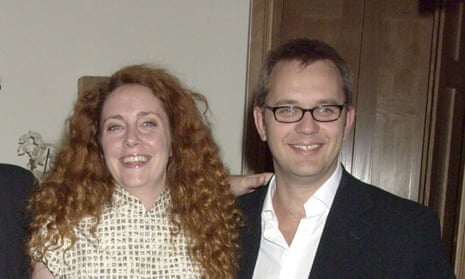The publisher of GQ magazine has been found guilty of contempt of court over a “very seriously prejudicial” article about the phone-hacking trial of Rebekah Brooks and Andy Coulson.
Condé Nast, the US publisher behind the magazine, was accused of publishing an article last year that could have “seriously impeded or prejudiced” the Old Bailey trial.
The article by the US journalist Michael Wolff, published during the trial last April, contained allegations that Rupert Murdoch, the owner of the now-defunct News of the World, was implicated in phone hacking, the high court in London was told.
The feature also included claims that had not been put before the trial jury, including that Brooks had received a £10.8m settlement from Murdoch.
Condé Nast is facing a large fine after the judges – the lord chief justice, John Thomas of Cwmgiedd, and Mrs Justice Nicola Davies – ruled that the article clearly created “a substantial risk” that the trial of Brooks, Coulson and other employees of the newspaper “would be seriously impeded or prejudiced”.

In a ruling handed down on Wednesday, Thomas said: “Prior to the Contempt of Court Act 1981, publication of an article that pre-judged the outcome would generally have been treated as a contempt. The provisions of section 2[2] [as developed in the case law] provide for a step-by-step analysis which protects the freedom of the press and balances the public interest in ensuring a fair criminal trial.
“On that analysis, it is in my view clear that the article published in the April 2014 issue of GQ created a substantial risk that the course of justice in the trial of R v Edmondson and others would be seriously prejudiced or impeded. Condé Nast therefore breached the strict liability rule and was therefore in contempt of court.”
Lord Thomas said a hearing would be held at a future date to decide on the penalty that should be imposed – including a potentially “unlimited” fine.
One senior legal source suggested the fine might be approximately £10,000 – a punishment described by Thomas in a separate contempt of court case in 2012 as “the very bottom end of the scale” – but pointed out that the article had not caused the trial to be halted or abandoned.
The article was trailed on the front cover of the April issue of GQ under the headline: “Hacking exclusive! Michael Wolff at the trial of the century.” Inside, the article was printed under a large picture of Brooks and titled: “The court without a king.”
Brooks, who was reinstated as News UK chief executive in September, expressed surprise when Wolff attended the trial shortly after it began. She was eventually cleared of all charges, but told journalists outside the courtroom that she was irritated about the article, which she felt was sexist. She said passages written about her in Wolff’s article would never have been written about a man.
The attorney general, Jeremy Wright QC, said the GQ article “went against the most fundamental principle of our criminal justice system – namely that everyone is entitled to a fair trial”.
Wright said the piece had the potential to interfere with the administration of justice. He told the Guardian: “I want to make it very clear that these actions are only ever used in order to protect the integrity of the judicial process and to remove the risk of jurors being influenced by external issues.
“My role involves both defending the freedom of the press as well as protecting the fair administration of justice. There is a delicate balance to be struck between the right to voice opinions publicly with the equally important need to ensure fairness in the justice system. In this role, I do not act as a member of the government but rather as guardian of the public interest.”
According to the high court ruling, the GQ editor, Dylan Jones, initially believed that the article could not be published until after the trial due to concerns it could be prejudicial. However, after taking legal advice, Jones decided to publish it. The article was immediately raised to the phone-hacking trial judge, Mr Justice Saunders, and referred to the lord chief justice by the attorney general.
Andrew Caldecott QC, for the attorney general, told the high court in July that there was a clear implication in the feature that lawyers for Brooks and Coulson had a “hidden agenda” of protecting Murdoch’s interests and concealing his involvement in phone hacking.
Adrienne Page QC, for Condé Nast, argued that the article had not created a substantial risk of serious prejudice. It was “a highly subjective, personal and impressionistic sketch based upon the experience of visiting the trial courtroom”, she said. It combined “commentary, opinion, speculation and whimsy” and “toys with possibilities, rather than makes assertions”.
It was difficult to state unequivocally what the author was trying to convey “beyond revealing his personal contempt for the Murdoch empire and his own history of those who have been engaged in its service”, Page said.
However, the ruling concluded: “I am left in little doubt that the effect of the article read as a whole was very seriously prejudicial.
“I cannot accept the submission advanced by Condé Nast that the article was riddled with ambiguity and lacking in identifiable assertions or that it was difficult to search for its meaning.
“On the contrary, it plainly implied that Mr Rupert Murdoch was a participant in the phone hacking, that the defendants must have been aware of the phone hacking, that the defence was being funded by him and conducted on the defendants’ instructions so as to protect his interests but in a way that might also secure their acquittal.
“It was not mere comment or observation, but an article that made the clear implications about Mr Rupert Murdoch, Mrs Brooks and Mr Coulson I have set out.”
The Daily Mirror was fined £50,000 and the Sun £18,000 in 2011 for contempt of court for their coverage of the arrest of Christopher Jefferies, who was later released without charge in the Joanna Yeates murder case. Vincent Tabak was found guilty of her murder in October 2011.
The following year, the Daily Mail and Daily Mirror were fined £10,000 each over their coverage of Levi Bellfield’s conviction for the murder and abduction of Milly Dowler.
